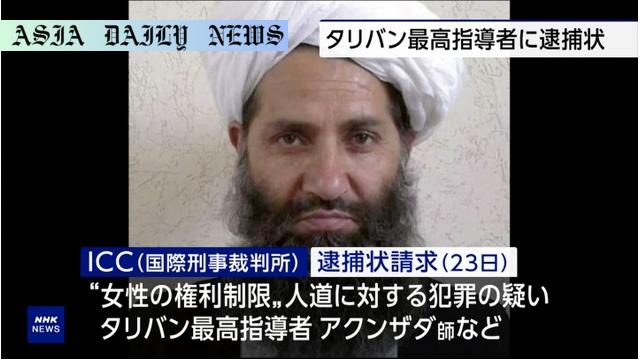Taliban: ICC prosecutor seeks arrest warrants for Haibatullah Akhundzada and Abdul Hakim Haqqani over persecution crimes.
Key Point 1: ICC Prosecutor seeks arrest warrants for two Taliban leaders.
Key Point 2: Accusations include persecution of women, girls, and LGBTQI+ individuals.
Key Point 3: Afghanistan’s Taliban regime faces international legal scrutiny.
Key Point 4: ICC action spotlights human rights abuses in Afghanistan.

Introduction
The International Criminal Court (ICC) has taken an unprecedented step in its fight for global justice by seeking arrest warrants against two prominent Taliban leaders. ICC Chief Prosecutor Karim Khan announced the warrants on Thursday, naming the Taliban supreme leader, Haibatullah Akhundzada, and chief justice, Abdul Hakim Haqqani, as suspects in crimes against humanity. This move represents a significant moment in the international community’s response to ongoing human rights violations in Afghanistan following the Taliban’s resurgence in 2021.
Accusations Against the Taliban Leaders
According to prosecutor Khan’s statement, the two Taliban officials bear “reasonable grounds” of criminal responsibility for gender-based persecution. These alleged crimes are classified as crimes against humanity under international law. The persecution, which he described as ‘unprecedented’ and ‘unconscionable,’ heavily impacts women, girls, and members of the LGBTQI+ community. Key violations include the denial of fundamental rights such as education, free expression, and broader social freedoms.
The Context of the Taliban’s Rule
The Taliban regained control over Afghanistan in 2021 following the withdrawal of U.S. and NATO forces. Since then, the group has imposed draconian policies that have disproportionately affected women and marginalized communities. Women are no longer allowed to attend secondary schools or universities, many have been barred from their workplaces, and public spaces have become increasingly restricted for women and girls. Institutions such as the judiciary are being used to enforce these laws, further entrenching systemic discrimination.
ICC’s Stance on Gender-Based Crimes
The significance of the ICC’s move lies in its recognition of gender-based persecutions as crimes against humanity. Karim Khan emphasized that violations of fundamental rights, including the right to education and freedom of expression, are not only national issues but global concerns. By filing this arrest warrant, the ICC seeks to uphold international law and challenge regimes that systematically persecute vulnerable groups. This is a powerful reminder that the global community will not tolerate such oppression without judicial consequences.
What Happens Next?
Now that the prosecutor has submitted the evidence, ICC judges are tasked with reviewing the case to determine whether the arrest warrants will be issued. If approved, the move could lead to diplomatic pressure and isolate Taliban leaders further. However, implementing the warrants within Afghanistan remains a significant challenge due to the Taliban’s tight control over the region and lack of extradition processes.
Global Implications
The ICC’s action sends a message that crimes against humanity will not go unnoticed. It not only holds the Taliban accountable but also sets a precedent for addressing gender-based crimes in conflict settings. This push for justice could create pathways for other international organizations and nations to act against systematic violations, signaling solidarity with the victims.
Conclusion
The ICC’s pursuit of justice for Afghan women, girls, and marginalized groups underlines the demands for accountability in global governance. While obstacles remain, this marks an important first step in acknowledging and addressing atrocities committed under Taliban rule. Whether through direct enforcement or symbolic pressure, the impact of these warrants could shape the future of international justice and human rights advocacy.
Commentary
A Bold Step by the ICC
The ICC’s decision to seek arrest warrants against senior Taliban leaders is both bold and necessary. It demonstrates that institutions we trust to uphold international justice are willing to challenge regimes accused of systemic oppression, even when those regimes are difficult to hold accountable due to geopolitical complexities. By taking this stance, the ICC reinforces the idea that crimes against humanity are a universal concern requiring collective action.
Confronting Challenges Ahead
However, there are considerable challenges on the horizon. The Taliban remains in full control of Afghanistan, and their cooperation with international institutions like the ICC is practically non-existent. This raises questions about how these arrest warrants will be enforced, which could potentially hinder the real-world impact of the ICC’s actions. Still, the issuance of such warrants sends a strong signal that these leaders are being watched, documented, and exposed on the world stage.
Representation for the Voiceless
This move is also profoundly symbolic for Afghan women, girls, and oppressed minorities. In a context where their voices are systematically silenced, the ICC is stepping in to advocate for their rights and to represent their plight in the international arena. This acknowledgment of their suffering carries deep meaning, even if the fight for immediate justice remains an uphill battle.
A Step Forward for International Law
Overall, the ICC’s actions are a step forward in the evolving narrative of international justice. While enforcement remains a challenge, the first and perhaps most critical battle is recognizing and documenting injustices. This move places justifiable pressure on leaders who commit atrocities and reminds the global community of its responsibility to protect human rights everywhere.


